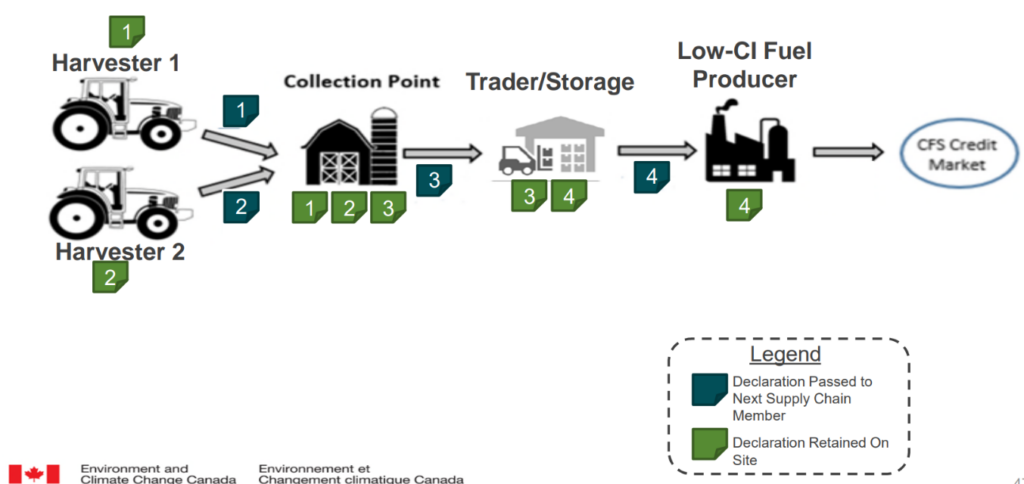As of July 2023, Canada’s Clean Fuel Regulations (CFR) are in effect, aiming to reduce greenhouse gas (GHG) emissions from transportation fuels. Administered by Environment and Climate Change Canada (ECCC), the CFR mandates stringent requirements for cleaner fuel production and emphasizes compliance and transparency throughout the supply chain. Fuel producers, importers, and suppliers are required to submit declarations to ensure their fuel feedstocks meet these environmental and regulatory standards.
A key component of the CFR is the Land Use and Biodiversity (LUB) criteria, which biofuel producers must adhere to for their low-carbon fuel feedstocks. U.S. biofuel producers, in particular, are obligated to submit an annual declaration affirming compliance with these criteria. This declaration must track the biomass feedstock from the point of harvest through processing and into the Clean Fuel Standard credit market in Canada, providing full traceability.

U.S. Feedstock Declaration Requirements
U.S. crop-based feedstocks, as a whole, qualify under the CFR’s LUB criteria, but producers must maintain annual declarations from each harvester, confirming compliance with the following four key criteria:
- Wildlife Habitat Criterion
The feedstock must not be harvested from areas that provide a habitat for rare, vulnerable or threatened species.
- Damaging Agents Criterion
Feedstocks must be harvested and transported using methods that prevent and control the spread of pests, invasive species and diseases.
- Indirect Land Use Change (ILUC) Criterion
Feedstocks must not create a high risk of indirect land use change that could negatively impact the environment.
- Excluded Land Criterion
Feedstocks cannot come from land that exceeds one hectare (approximately 2.47 acres) and was uncultivated forest, wetland or grassland areas on or after July 1, 2020. Feedstocks also cannot be harvested from land that had never been cultivated prior to July 1, 2020.
While U.S. crop-based feedstocks automatically meet the LUB criteria under recognized agreements and exemptions, an annual signed declaration is still required to maintain compliance and ensure accurate documentation for the Canadian market.
Meeting Compliance: U.S. Producers Approvals and Exemptions
U.S. crop-based feedstocks (including corn oil) already satisfy the LUB criteria, thanks to established documents recognized between Canada and the U.S. These exemptions include:
- Wildlife Habitat and Damaging Agents Criteria are met through Canada’s legislative recognition of U.S. feedstocks being named compliant.
- Indirect Land Use Change (ILUC) Criterion ensures U.S. crop feedstocks align with and are satisfied by the requirements set out in the European Union’s Annex. Feedstocks listed in the Annex table that do not exceed 1% in the “Average Annual Expansion of Production Areas since 2008” column and do not exceed 10% in the “Share of expansion into land referred to in Article 29(4)(b) and (c) of Directive (EU) 2018/2001” column are considered compliant with this criterion.
- Excluded Land Criterion is fulfilled through Canada’s acceptance of the U.S. Environmental Protection Agency’s (EPA) aggregate compliance approach for renewable biomass.
Again, the annual signed declaration remains a mandatory step in maintaining a compliant and traceable supply chain for low-carbon fuels.
What Should Be Included in the Declaration?
The declaration process must begin with the feedstock harvester and must accompany the feedstock through each stage of the supply chain. Declarations must include:
- Basic Information: The harvester’s name, address, contact information, and any authorized agent’s details.
- GPS Coordinates: Precise location data of the harvest site, accurate to five decimal points.
- Land Use Compliance: Affirmation of compliance with environmental criteria (e.g., wildlife habitat, damaging agents, excluded land, and indirect land use).
- Feedstock Details: Information about the feedstock type, quantity, and, if applicable, the buyer.
Understanding and adhering to compliance requirements is critical for U.S. producers participating in Canada’s low-carbon fuel market. The annual declaration for U.S. feedstocks serves as an essential tool to ensure the supply chain is transparent and meets the necessary criteria. By maintaining accurate documentation and submitting these declarations on time, U.S. biofuel producers can continue to contribute to the growing demand for low-carbon fuels.




